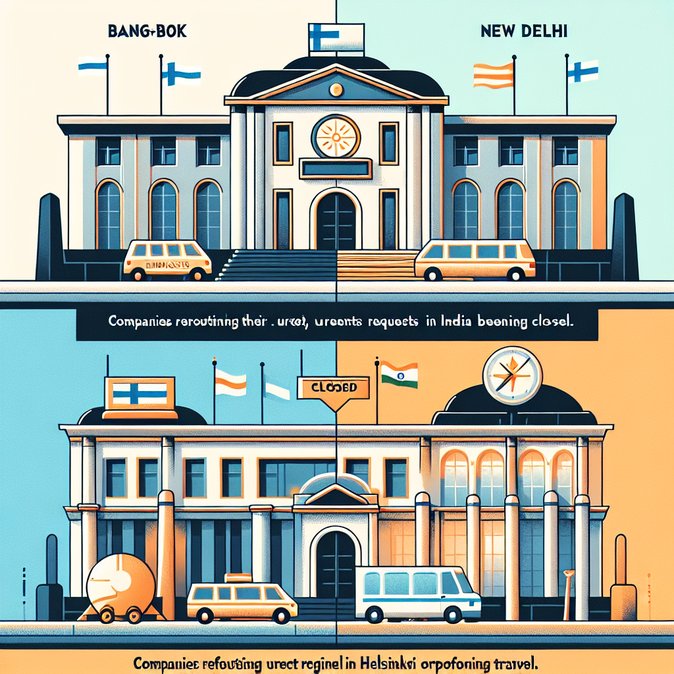
In a surprise move on 7 November 2025, the European Commission issued binding guidance instructing Member States to stop issuing multiple-entry Schengen visas to Russian nationals. Instead, each journey must now be covered by a fresh single-entry visa, allowing consulates to vet travellers case-by-case.
For Finland—whose 1,340 km land border with Russia is the longest of any EU country—the decision carries outsized operational consequences. Helsinki closed its eastern crossing points in late 2023 but still processes thousands of visa applications a month from Russian residents who fly via Helsinki Airport to other parts of Europe. Finnish missions in Moscow, St Petersburg and Murmansk anticipate a 40–50 percent increase in workload because every frequent traveller will need a new sticker each time. The Foreign Ministry has already authorised overtime for consular staff and is considering a mandatory appointment system to manage queues.
![EU Ends Multiple-Entry Schengen Visas for Russians—Finland Braces for Surge in Single-Trip Applications]()
Business groups largely welcomed the security-led tightening. The Confederation of Finnish Industries (EK) said predictable border procedures are vital and urged the government to devote extra resources to avoid processing delays that could hamper legitimate trade in the north-south logistics corridor. Tour operators were less sanguine; the Association of Finnish Travel Industry warned that single-entry visas will make weekend shopping trips by affluent St Petersburg residents “economically irrational,” threatening retailers in Lappeenranta and Imatra.
On the political front, Interior Minister Mari Rantanen called the Commission’s step “proportionate” in light of what she described as Russia’s continuing "weaponisation of migration." NGOs, meanwhile, stressed that exemptions for dissidents, independent journalists and human-rights defenders must be applied generously. The Finnish Immigration Service (Migri) confirmed that humanitarian and family-based cases remain eligible for multi-year D-visas under national rules, but only after strict background screening.
Practically, mobility managers should warn Russian assignees and frequent business travellers that lead times for Finnish (and other Schengen) visas may lengthen in the coming weeks. Employers should factor extra days into project schedules and consider remote-work alternatives when urgent travel is not feasible.
For Finland—whose 1,340 km land border with Russia is the longest of any EU country—the decision carries outsized operational consequences. Helsinki closed its eastern crossing points in late 2023 but still processes thousands of visa applications a month from Russian residents who fly via Helsinki Airport to other parts of Europe. Finnish missions in Moscow, St Petersburg and Murmansk anticipate a 40–50 percent increase in workload because every frequent traveller will need a new sticker each time. The Foreign Ministry has already authorised overtime for consular staff and is considering a mandatory appointment system to manage queues.

Business groups largely welcomed the security-led tightening. The Confederation of Finnish Industries (EK) said predictable border procedures are vital and urged the government to devote extra resources to avoid processing delays that could hamper legitimate trade in the north-south logistics corridor. Tour operators were less sanguine; the Association of Finnish Travel Industry warned that single-entry visas will make weekend shopping trips by affluent St Petersburg residents “economically irrational,” threatening retailers in Lappeenranta and Imatra.
On the political front, Interior Minister Mari Rantanen called the Commission’s step “proportionate” in light of what she described as Russia’s continuing "weaponisation of migration." NGOs, meanwhile, stressed that exemptions for dissidents, independent journalists and human-rights defenders must be applied generously. The Finnish Immigration Service (Migri) confirmed that humanitarian and family-based cases remain eligible for multi-year D-visas under national rules, but only after strict background screening.
Practically, mobility managers should warn Russian assignees and frequent business travellers that lead times for Finnish (and other Schengen) visas may lengthen in the coming weeks. Employers should factor extra days into project schedules and consider remote-work alternatives when urgent travel is not feasible.


